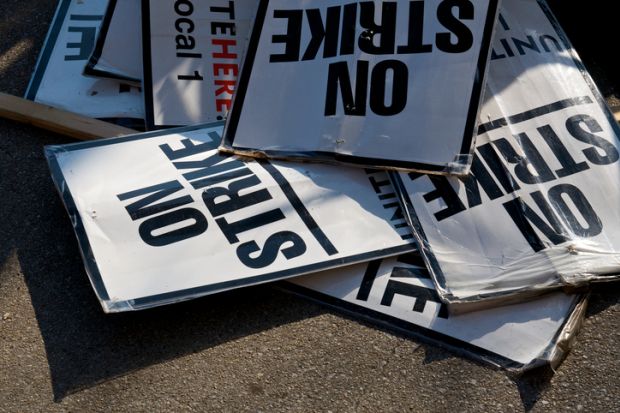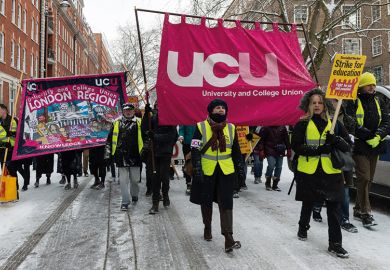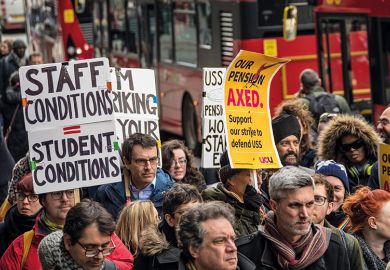As the oppressive heat sets in, cloying like a close and uncomfortable truth, thoughts turn to the long summer ahead; deserted campuses distorted by heat haze, sweaty lethargy punctuated by undergraduate open days, and the ever-coinciding union strikes that latch on to them.
What more inflammatory topic stokes such knotted emotion, a conflagration of self-interest, perceived injustice and personal identity? I remember a distant acquaintance, an old union man of another industry, telling his 17-year-old daughter, “People like us don’t go to university.” A case study in destructive self-actualisation. To my shame, I never took him up on the issue, and I don’t know what became of the daughter. A stain of passivity left on my character.
In another memory, an acquaintance raises a hand to ardently declare, not so much on a tangent as a spittle-flecked island in the flow of conversation, that he would always support the right to withdrawal of labour. Later pondering the various layers of incongruence, I came to the view that striking, in its breach of contractual promise, claims its justification only on pragmatic grounds for the imbalances of power redressed and the social good it has achieved. On that afternoon my passivity cost me fuller appreciation of my friend’s argument, although surely saved a prolonged dowsing in his spittle.
Whatever rights and wrongs my friend may have postulated, the tactic, not confined to my campus, of striking only on open days takes us beyond stoic withdrawal of labour and into active extortion, first threatening, then attempting, maximum damage to student recruitment and public perception.
As yet no blacklegs have been killed.
The perennial hot topic of pensions is particularly offensive. The private sector began stamping out their defined benefit schemes more than 30 years ago, at first recognition of actuaries’ grossly miscalculated costings. In contrast, our unions now await yet another valuation exercise, desperate for even a single piece of evidence to prop up the only conclusion that they are willing to believe.
It is through an unquantified mixture of kindness and weakness that the higher education sector has allowed this time bomb to continue to tick on. Since no good deed goes unpunished, in consequence of those extra decades the problem is now 30 years worse, the entrenched unionists 30 years more entitled, and still the same cloying problems of unkeepable promises pend resolution.
On the side of weakness, we can expect the shadow across our institutions’ financial futures to grow longer as another generation of vice-chancellors endeavour to kick the issue forward for an unspecified successor to deal with.
Those I speak to on pickets recognise only their disappointed expectations, never the impossibility of fulfilment; talk only in one-sided entitlement, never in mutual fairness. The determination to cast employer as swindler is clear, but no man-eating commercial enterprise in the private sector would ever have allowed a financial exposure to run so out of hand.
As a last resort, the slippery slope is invoked, an argument to which individual sympathies differ. (I venture that if a moral argument does not stand up without its use, one’s position is likely to be found immoral. But then I would, wouldn’t I?) If the slippery slope is in case at all, surely the university, giving pay rises in lean years when industry had none, giving short working days and extra bank holidays, extorting precious little overtime, must be close to some kind of a nadir?
Even in strikers’ pay deductions my institution plays the role of insufferable supplicant. Strikers sacrifice one 365th of their annual salary, despite earning that salary over fewer than 200 working days. For cheap extra holiday, sign up to the union.
Yet to give anything back is unthinkable.
How might staff make heard their opposition to the union line? By counter-strike, conducted only during lunch breaks and maintaining full productivity? Unlikely. By paying union fees, sitting through meetings and arguing for balanced perspective? Who among us has virtue, or proactivity, in such abundance? Would anybody care?
A colleague reports encountering a small picket angrily complaining that our institution routinely paid support staff below minimum wage. The assertion didn’t seem right, so he talked to them to establish the basis of their claim. It transpired that they were using a previous year’s salary data against updated minimum wage rates. Rather than discuss the suspected offence with the university, they took straight to the streets. When the group recognised their error, they reputedly looked at their placards, then their leaflets, and asked “Well what do you want us to do? Just give up and go home?”
No. Already committed, they passed the afternoon falsely smearing the university. Anything less would look like backing down.
Such errors of thought are ironic when we consider specifics among the much-vaunted development of the intellect and ability to think conferred by higher education. We might expect escape from such pitfalls as leaping to wishful conclusions that caricature evil master and victimised proletariat, or reaching beyond moral boundaries to find utility for our work. Mistakes that ought to be made early in our intellectual lives, swiftly recognised and carried with shame thereafter.
If it is true that some administrative staff have not had the benefit of a university education themselves, there should surely be sufficient unionised staff who have to keep the others on the intellectual straight and narrow. But transactional analysis tells us that these are games even most intelligent people play, and failures of the intellect occur visibly at all levels and on both sides of the dispute. I write anonymously not only to protect my institution from a distasteful association, but to protect myself from the institution. After a previous article (evidence-based and rather less inflammatory) our guardians of academic freedom in senior management, whose political wind blew in a different direction, decreed my local career prospects dead. (And still I don’t learn.)
After all, under sufficient scrutiny, who among us is better than a failure and a hypocrite?
Stanley Ipkiss is a pseudonym for the anonymous author.
Register to continue
Why register?
- Registration is free and only takes a moment
- Once registered, you can read 3 articles a month
- Sign up for our newsletter
Subscribe
Or subscribe for unlimited access to:
- Unlimited access to news, views, insights & reviews
- Digital editions
- Digital access to THE’s university and college rankings analysis
Already registered or a current subscriber?




